
About This Quiz
When it comes to trivia about the Vietnam War, there a lot of people out there who have some pretty solid skills. But what about the lingo and the slang that comes from that time?
The Vietnam war went on for 16 long years and was one of the most divisive things in the history of America. So there is no wonder that a lot of new slang came out of that time. Do you know the origins of the word "boondocks?" Would you be on the side of the Vietniks or not? Do you think you would have made a good tunnel rat?
We know that you have what it takes to ace this quiz. You have a strong desire for knowledge and have long been interested in different cultures, world history, and the science of politics, so it is pretty likely you have some knowledge of what went on in the days of the Vietnam War. But are you ready to put that knowledge to the test? Just make sure that when you leave your hootch you watch out for those punji stakes, they sting a little.
You don't have to travel a klick to show us your knowledge of Johnson's war. You just need to take this quiz. Go ahead, don't be MIA.
American soldiers were grunts, the men grunting and groaning their way across Vietnam. If you were deployed, you most likely did not want to be a grunt.
"Donut dollies" was a slang term for women from the Red Cross. They provided support for combat-fatigued men, and some even visited the front lines.
It was a never a good thing if your buddies bought the farm. It meant that they died.
Advertisement
They used "Charlie" as a nickname for the Viet Cong soldiers they were fighting. They also used an extremely racist word, one that we will not repeat here.
You didn't want to be stuck with tunnel rat duty. It meant that you had to enter the Viet Cong's network of tunnels and root out any remaining enemies.
Some used "chop-chop" as a term for eating, but often it meant that you needed to hurry up.
Advertisement
American soldiers relied heavily on "birds," or helicopters. Helicopters were the only way in or out of some areas of rugged terrain.
In Vietnam, sex was often called "boom-boom." Local prostitutes, then, were "boom-boom girls."
"We've got incoming fire from a ridge five klicks west!" The word "klicks" referred to kilometers.
Advertisement
A hootch was simply a soldier's living quarters. And in Vietnam combat zones, that often meant little more than a foxhole or a tent. Hootch also referred to booze.
The term "barbecue" was sometimes used to call in a napalm attack. Napalm, of course, creates a catastrophic, fiery explosion that burns everything its path.
"CC" stood for corrective custody. Misbehaving soldiers were sent to CC until they could learn to follow orders.
Advertisement
Veterans sometimes sent new recruits off to look for "breech keys," a fictional item. When you're in a combat zone, you have to make your own fun.
The M79 grenade launcher was great for destroying enemies from afar. Some soldiers called it the "Thumper."
They used the term for both male and female children. Some American soldiers developed kind relationships with baby san … others did not.
Advertisement
Diggers were infantrymen from Australia. The term became common during World War I.
Vietnamese refugees often fled combat areas by boat. Their often frantic scrambles earned them the nickname "boat people."
"Clackers" were firing devices that made explosives go "boom." Without clackers, some munitions were worthless.
Advertisement
In perilous situations, some men refused to be led by certain (perhaps incompetent) officers. They'd assassinate their leader by "fragging" him with a fragmentation grenade.
Artillery guns could be used to fire flares meant to illuminate combat zones. It was called "hanging a light."
Both Vietnamese and American soldiers used this term. Dinky dau meant someone was crazy. The horrific war drove many men nuts.
Advertisement
No one wanted to be stuck on honey dipper duty. It meant that you were required to bury human excrement.
The whirling blades of helicopters earned them the name "egg beaters." In dire situations, egg beaters were a salvation of sorts.
The Hanoi Hilton was a notorious prison operated by the Viet Cong. It was here where many U.S. soldiers were interrogated and tortured.
Advertisement
Many soldiers developed substance abuse issues while deployed in the war. "Dew" was slang for marijuana.
Ground soldiers loved to witness eagle flights. It meant that American helicopters were mounting a large-scale assault.
The "blue water navy" handled duties in the open ocean. The brown water navy traveled up rivers in support of ground troops.
Advertisement
The Vietnamese jungle was a perfect place to contract malaria from mosquitoes. "Monday pills" were anti-malarial drugs taken once per week.
Every combat soldier wanted a trip on the "Freedom Bird." It meant that they'd been discharged and were heading home to America.
The cherries were the guys who had never seen any real combat. Many of them were sadly ripe for the picking by more experienced enemy combatants.
Advertisement